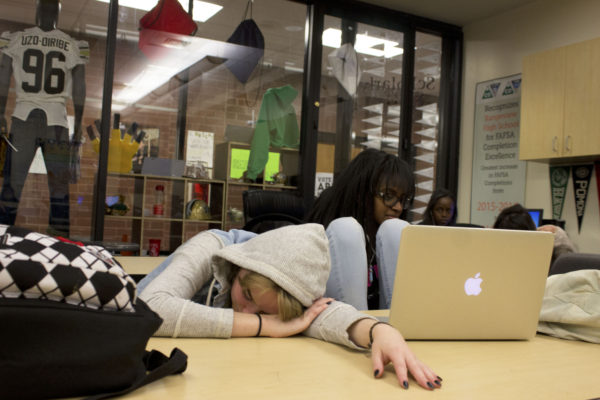Feature Photo By: Mya Johnson – Senior Trinity Zody (left) takes a nap in the College and Career Center next to senior Showiet Perry (right) in this posed photo. Many students fall asleep in class or take naps during their off periods to catch up on sleep.
My alarm goes off at 6:30 every single day. I pull myself out of bed, sometimes as late as 6:50. Then, I’m scrambling — still half asleep — to get to my first period before the 7:30 bell. Although I’ve gotten better, I used to be late most days. I’m not the only student like this. Many people in my first period stroll in five or ten minutes after class has started; they all look as tired as I feel.
Now imagine that same scenario but alarms go off at 7:30 or even 8:00. There’s no scrambling and there’s less sleepiness. That’s the lives of Cherry Creek students and soon it will be the lives of Thompson School District students.
According to a senior at Eaglecrest High School in Cherry Creek, Kaitlin Marler, “I feel more motivated to get my work done rather than the need for sleep.”
The increase of motivation makes sense. Sleep is very important, especially to a teen whose brain is still growing. Not getting enough can make it hard to engage.

In fact, “the secretion of the sleep hormone melatonin begins at about 10:45 p.m. and continues until about 8 a.m.,” as theconversation.com stated, which means that starting school at 7:30 just doesn’t make sense. If, biologically, our brains do not even wake up before 8, why would school start before then?
It’s evident that students learn better when they are rested — when school times are pushed back. Studies have shown this trend and many students agree that they can see a difference in their school performance after later start times.
“My performance at school has definitely gone up as well as my grades,” Sarah Gleason, a junior at Cherokee Trail High School, said. “And I can honestly say that I’m in a better mood when I get up in the morning.”
“I wake up and feel a lot better about going to school.” Eaglecrest senior, Maddie Gregory, continued, “I actually enjoy school more and I’m ready to actually focus.”
Joanna Mendy, a senior at Overland High School, stated, “I feel like my mood, in general, is better because I’m not waking up at 5 or 6. I feel more prepared to tackle problems and be engaged.”
On the other side of the spectrum are APS students. According to a poll on the Raider Review Twitter page, 90% students voted that they are sleep deprived; only 10% voted that they get enough sleep.
Nadya Nfaoui, Rangeview senior and student body president, said, “I am super sleep deprived; it makes my mood plummet and it doesn’t always allow me to concentrate for the second half of the day.”
It’s not just that students don’t want to wake up early because we’re lazy. It’s that school would be easier to handle, our moods would improve, and our grades would probably increase with better rest.
“There are countless times I can recall waking up late for school or falling asleep in class,” says Rangeview senior Darrin Fauser. “When I am tired like this, I have absolutely zero motivation to do anything during the school day.”
Maybe it’s not about the students. That’s fine. But if it’s not about us, then it should be about the district’s pockets. Just last year, it was revealed that our district was in a hole 31 million dollars deep. This just led to tremendous budget cuts. Teachers were let go, late start Wednesdays were taken away, and class sizes increased.
One thing they did not consider was pushing back start times to help with the budget. A study done by RAND revealed that starting school later in the morning would benefit school districts and the U.S. economy greatly.

They wrote, “Even after just two years, the study projects an economic gain of $8.6 billion to the U.S. economy,” and that the average annual financial gain during a 15-year period would be 9.3 million dollars.
So, if it would save students’ mental health, and it would help the district’s budget, why hasn’t APS gotten on board with later start times?
Part of it has to do with the fact that it’s just how things have been. Since the 70’s, students have been going to school around 7:30 in the morning. I guess once things were set, they never changed. Because the students that attended school in the 70’s and 80’s are now the ones that are in charge of our schools, and that’s how it was for them, they don’t see a need to change it.
Parents are also not completely on board with the idea, either. Many are concerned with later release times and with their children not having enough time for afterschool activities.
Gregory stated that a lot of the teachers at her school ask for feedback from students. The students agreed that “they like sleeping in a lot and the day doesn’t end too late.”
I think it’s hard to weigh your options out when none of them are perfect, but when money and student health are on the line, it suddenly seems like an easier choice.
The reason this is such a pressing matter now is because many new members were just elected to the APS school board. These are the people that are making decisions for the students throughout the district. I would like to hope that they have the best interest in mind for us and our health.
Nfaoui stated, “A later start time would definitely help me get all of my ducks in a row and I think it would assist me with time management too… and not feel like I was dragging a ton of bricks with me.”
With Cherry Creek and Thompson school districts paving the way for us, many other Colorado districts can follow their lead and push back start times, including our very own Aurora Public Schools.
“If I could get more sleep I think I would enjoy school a lot more,” Fauser agrees.
High schoolers are sleep deprived and stretched too thin. We are sleep deprived and stretched too thin, and it’s time to change that.






